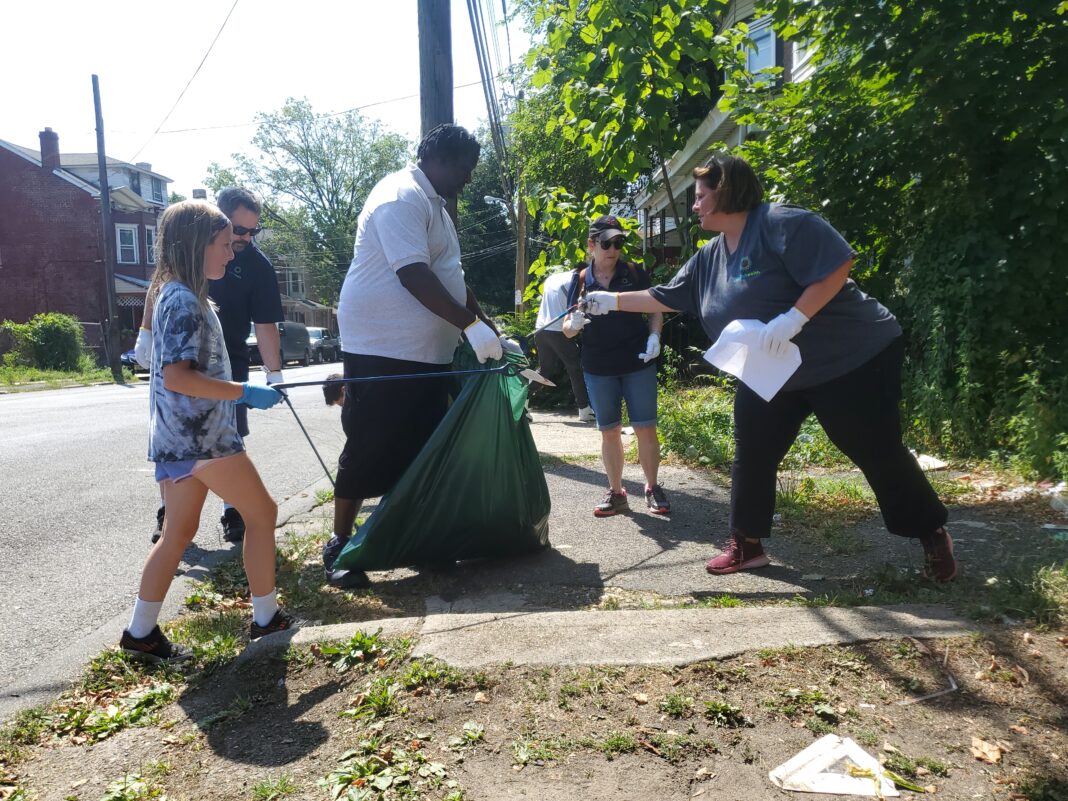Trenton residents took to Martin Luther King (MLK) Boulevard equipped with gloves, reach extenders, and trash bags.
It was a combined effort of the Trenton Health Team, Isles, Capital Health, Trenton Community Street Teams, and the City of Trenton Mayor’s Office. Volunteers were able to work their way around a community and speak with residents as they cleaned litter left on the side of the road.
Perry Shaw III is Executive Director of building a Better Way for Trenton and one of the leaders of the Trenton Community Street Team. He explained that this shouldn’t be a one-time fix.
“We’ve all been in cleanups where people just come in. They have a party, people leave, and then they come back a week later, and everything’s the same. No, this is about having a transition. This is about showing people how to build up the community, how to keep the community clean,” Shaw said.
The hope is to have these kinds of clean-ups monthly to connect to the Trenton community and talk with residents about issues facing their community. Dr. Eric Schwartz, Vice President of Community Health and Transformation at Capital Health, worked his way around with his group.
“We are in our neighborhood, in our community, and we are cleaning. We just looked at a map, and everybody took a section,” Schwartz said. They joined the Street Clean up as a part of their Trenton Neighborhood Initiative. “There are four main pieces, live, work, grow and connect. So it’s about making a difference in the community around the hospital, our neighbors, and how we can improve everybody’s quality of life,” Schwartz said.
To help on that mission, they have partnered up with local organizations like the Trenton Health Team. “Trenton Health Team just has that set of skills and resources that we frankly don’t, so why invest in duplicating, you know, there’s so much work to be done…Instead, we partner, we collaborate, so that we can attain the goals that we need,” Schwartz said.
To do this, they are becoming more community-based. Part of that is helping Trenton Health Team in their Home Improvement Program, where they are offering support on the block of MLK Blvd to help residents repair their homes. Alix Fellman, Director of the Trenton Neighborhood Initiative at the Trenton Health Team, explained that they don’t want to make a difference for just one day but instead create systemic change.
“We don’t want to start making the outside of somebody’s house pretty, but we wanted to impact the whole block. This is the first of many cleanup events we’ll be hosting,” Fellman said.
Trenton residents are more than willing to help. Kerth McRae, a Trenton resident, was out looking to be a part of the change.
“It will impact the community very well,” Mcrae said. “I also would like to take part in that…It’s a good cause. Communities need to come together. These are the kind of things we need to do.”
That was the leading theme of the street clean. Clean the streets, build communities, and make a difference. Volunteer Simon López, who lives in southward came to help and make connections.
“A consistent clean-up like this, I think, can start a new culture for those willing to adopt that mentality that this is a community to be taken care of. And this is a community worth trying to preserve. So if that mentality gets adopted, I think these types of events can help make that happen,” Lopez said.
On top of the other community reach-out programs happening, Shaw explained that the Trenton Community Street Teams’ goals were to help the community help themselves. Created by Isles Trenton Community Street Teams (TCST) is urban community safety and violence intervention initiative focused on reducing violent crimes by interrupting the cycle of retaliation.
By using an evidence-based, trauma-informed approach, their goal is to help the Trenton community connect to vital services, moderate and calm disputes that could result in violence, provide safe travel to and from school, and overall connect with the community on issues that everyday Trentonians are dealing with.
However, Shaw said they couldn’t do this without the community’s help.
“It has to be community buy-in, and it has to be the community not only helping to lead but being at the forefront of us supporting them and providing them the tools…This isn’t a magic solution. This is one tool in the public safety toolbox,” Perry said. “This is about empowering the community to know how to deal with problems or issues they’re facing.”





